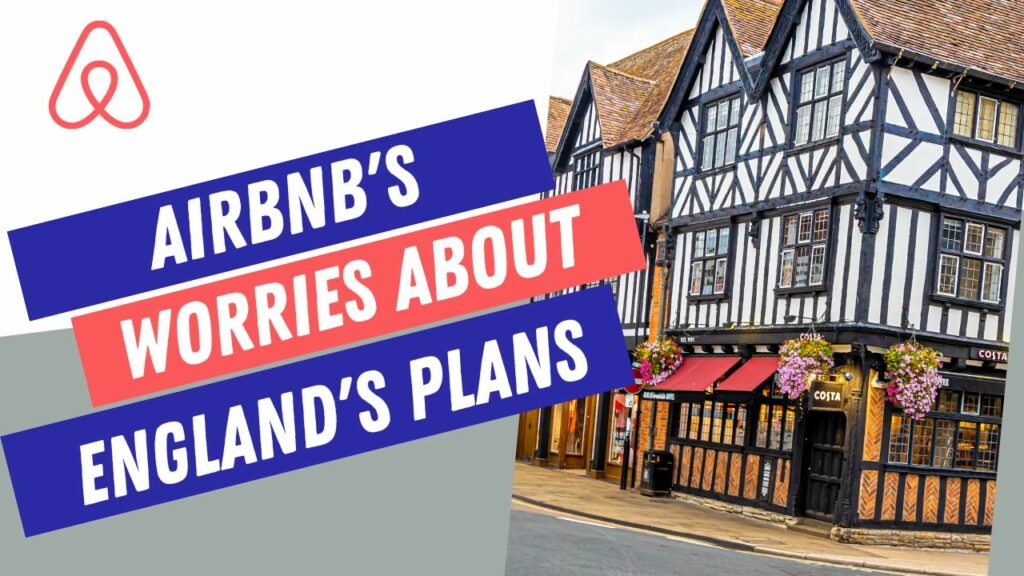As the consultation on registration and use class for short-term lets in England unfolds, Airbnb, one of the major stakeholders in the short-term rental market, has voiced its concerns. Amid the proposed changes, one of Airbnb’s primary worries revolves around potential obstacles and restrictions for its hosts. In this article, we summarize Airbnb’s position, provide context on the consultation, and explore the implications for Airbnb hosts.
Airbnb is particularly concerned about these proposed changes’ impact on its hosts. They fear that the introduction of a registration scheme and the designation of a specific use class for short-term lets could impose additional administrative burdens and potentially hinder hosts’ ability to benefit from short-term letting as a supplementary income source.
In the following sections, we delve into Airbnb’s perspective, their position on the proposed planning changes, and their call for a fair and consistent scheme that balances regulation and the needs of hosts. Additionally, we address frequently asked questions to provide further clarity on key aspects of the consultation.
Consultation on Registration and Use Class for Short-term Lets in England
Organisers of the Consultation
This consultation process in England is spearheaded by two government bodies:
- The Department for Digital, Culture, Media & Sport (DCMS): They’re focusing on establishing a registration system for short-term rentals, including properties listed on platforms like Airbnb.
- The Department of Levelling Up, Housing and Communities (DLUHC): Their attention is on the potential introduction of a distinct use class for short-term rentals.
It’s essential to remember that this consultation and the resulting actions will only be applicable in England.
The Proposed Registration Scheme
The government is considering a proposal that would require short-term rental properties to be registered in a specific system. The goal is to improve the monitoring of these properties to ensure safety standards are maintained, housing markets are balanced, and neighbourhood harmony is sustained. This proposal stems from concerns around:
- Difficulty in monitoring safety standards in short-term lets.
- The effect of short-term rentals on local housing availability.
- Potential inflation of house prices due to short-term rental demand.
- Instances of disruptive behaviour associated with some short-term lets.
This proposed registration system aims to bring a consistent standard across all short-term rentals.
Introducing a Use Class for Short-term Lets
Alongside the registration proposal, the DLUHC is considering creating a separate planning class for short-term rentals. This move could offer local areas more regulatory control over the number and placement of short-term rental properties. Feedback from all stakeholders is being sought on this issue.
In summary, the English government is assessing ways to maintain the balance between the advantages of services like Airbnb and the needs of local communities. This assessment might result in new regulatory requirements for hosts. Hence, this consultation period is an opportunity for all stakeholders, including hosts, to express their opinions and influence potential changes.
Airbnb’s Perspective and Worries Regarding the Proposed Registration Scheme
Airbnb’s Position
Airbnb backs the idea of new rules and has persistently advocated for balanced and effective regulations. They recognise the potential benefits of a registration scheme that would help oversee and maintain high standards in the short-term let sector.
Inclusion of Wider Visitor Economy
However, Airbnb has raised queries about the registration scheme only encompassing short-term lets and leaving out the broader visitor economy. They contend that a more comprehensive view of visitor accommodation could provide valuable insights into tourism trends and steer investment decisions in local tourism infrastructure.
Worries About Potential Obstacles for Hosts
Airbnb is cognizant that many hosts depend on the income from their properties, particularly during economic downturns. They harbour concerns that new regulations could erect barriers for hosts who want to join or remain in the visitor economy.
Call for a Fair and Consistent Scheme
Airbnb argues that the registration scheme should be even-handed and should not overly burden any party involved. They suggest it should be comprehensive, applicable to all local authorities in England, and managed by an organisation such as VisitEngland, which should be adequately supported and resourced.
Registration Details
According to Airbnb, the property, not the operator, should be registered. However, the scheme should also collect the operator’s details. They suggest fees should only apply to those operating dedicated short-term lets, defined as properties let out for 105 nights or more per year.
Self-Certification System
To keep the system efficient and to sidestep bureaucracy, Airbnb proposes a self-certification approach where hosts affirm their compliance with all relevant regulations. The registration number should be issued automatically and without discretion.
Data Sharing
Airbnb asserts that limiting the scheme to short-term lets and not including annual occupancy data will impede the effectiveness of the data collected. For a clearer view of rental activity, Airbnb believes intermediaries and operators who take bookings directly should also provide data on the number of occupied nights per registered property.
Airbnb’s Position on England’s Proposed Planning Changes:
Airbnb supports making the planning system simpler and clearer for hosts. However, they have concerns about the proposed changes. They believe:
- The changes could make things more complicated and bureaucratic for hosts.
- The changes could unfairly restrict hosts who share their primary residence.
- Local authorities might introduce unnecessary restrictions on STLs.
Instead, Airbnb suggests:
- Setting a “threshold” of 105 nights per year for STLs, rather than a cap. This means you could rent out your property for up to 105 nights a year without needing to change its use class.
- Requiring local authorities to use data from the DCMS register of STLs when deciding whether to introduce restrictions on STLs, known as “Article 4 directions”.
Potential Negative Impacts for Hosts
According to Airbnb, the proposed changes could have several negative impacts on hosts:
- Increased complexity: The changes could make it harder for you to understand and follow the rules.
- Restrictions on primary residences: If you share your primary residence, you could be unfairly restricted in how often you can rent it out.
- Unnecessary restrictions: Local authorities might introduce restrictions on STLs without good reason, which could limit your ability to rent out your property.
- Cost of planning permission: If you want to offer new STLs above a certain threshold, you might need to pay for planning permission. This could reduce your income from hosting.
Airbnb also highlights that their host community is incredibly diverse, and the proposed changes could adversely affect hosts who rely on the income from hosting to afford their homes or save for retirement.
Frequently Asked Questions
Why is the discussion about ‘use’ important? What would it change for an Airbnb host?
The ‘use’ of a property in planning terms refers to what the property is primarily used for. The government is proposing to create a new ‘use class’ specifically for properties used for short-term lets. This is important because it could change the rules around how you can use your property as an Airbnb host. For example, you might need to apply for planning permission to change your property’s use class if you want to rent it out as a short-term let for more than a certain number of nights a year.
What is the difference between a cap and a threshold? What would it change for an Airbnb host?
A ‘cap’ is a limit on the number of nights you can rent out your property as a short-term let. If you exceed the cap, you might need to apply for planning permission to change your property’s use class.
A ‘threshold’, on the other hand, is a point at which something changes. Airbnb is suggesting a threshold of 105 nights per year for short-term lets. This means you could rent out your property for up to 105 nights a year without needing to change its use class. If you want to rent it out for more than 105 nights a year, you might need to apply for planning permission.
What is Article 4?
Article 4 of the Town and Country Planning (General Permitted Development) (England) Order 2015 allows local authorities to remove certain permitted development rights. In the context of short-term lets, this could mean that a local authority could introduce restrictions on STLs in certain areas. For example, they might require hosts to apply for planning permission to change their property’s use class if they want to rent it out as a short-term let. This could make it more difficult and costly for you to rent out your property.







![Trump-Era Policies Fuel Travel Uncertainty: Fewer Canadians, Europeans to U.S.—Fewer Americans to Europe [Early Data]](https://www.rentalscaleup.com/wp-content/uploads/2025/04/Trump-Era-Policies-Fuel-Travel-Uncertainty-Fewer-Canadians-Europeans-to-U.S.—Fewer-Americans-to-Europe-Early-Data-150x150.jpg)
